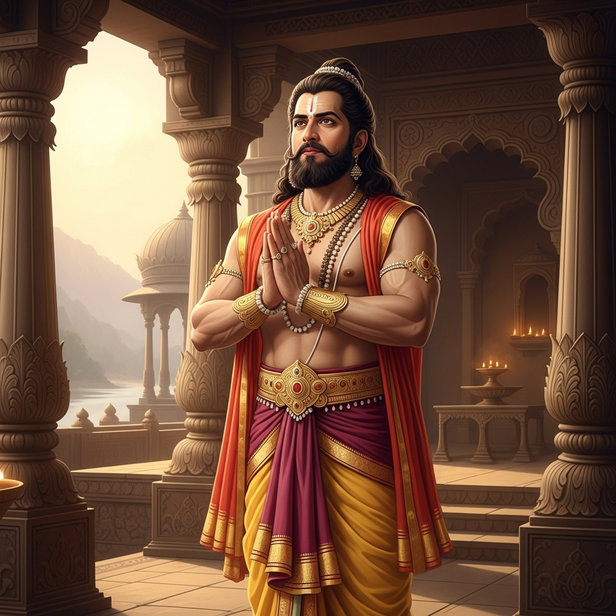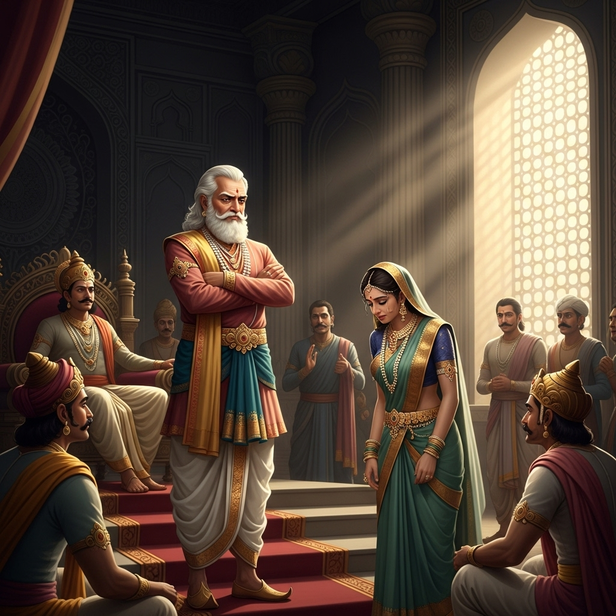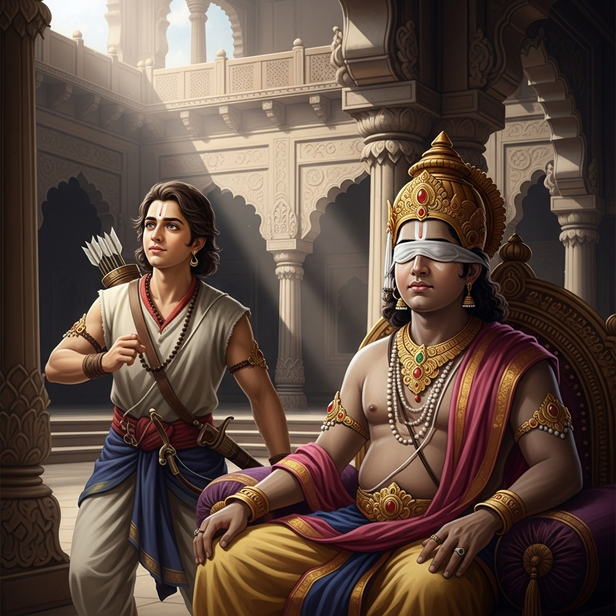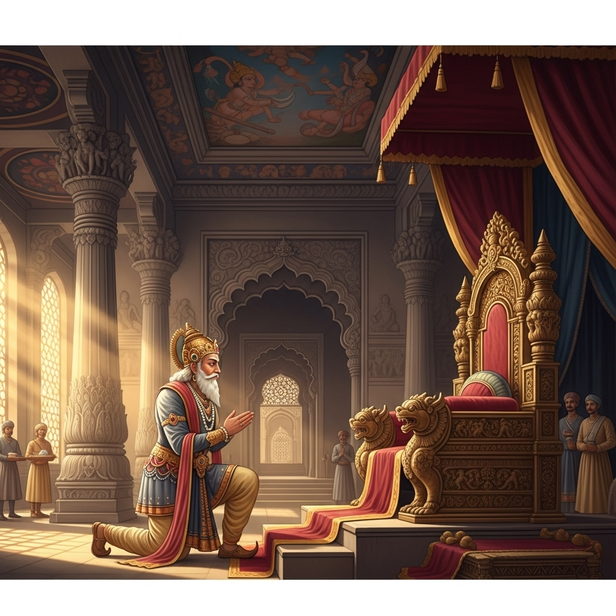Why Bhishma’s Vow Destroyed the Kuru Dynasty
Noopur Kumari | Sep 12, 2025, 09:09 IST
Mahabharat
( Image credit : Times Life Bureau )
Bhishma Pitamah’s vow of celibacy was hailed as the greatest sacrifice in the Mahabharata. It earned him respect, admiration, and eternal glory. Yet, the same vow became the seed of destruction for the mighty Kuru dynasty. This article explores how a decision born out of love and loyalty became the chain that dragged Hastinapur into war. It also reflects on how our own choices, however noble, can sometimes lead to unexpected consequences in life.
Every decision we make ripples across generations. Some vows uplift, while others unknowingly bring downfall. Bhishma’s vow to never marry and never sit on the throne was considered the ultimate sacrifice of dharma. But hidden in that sacrifice was a tragedy that the Kuru family could never escape. Without a rightful heir of strength and virtue, the kingdom fell into chaos, leading to the great war of Kurukshetra. This is not just mythology it’s a reminder that even noble intentions can have painful results.

When King Shantanu fell in love with Satyavati, Bhishma made a sacrifice so great that it echoed through time. To honor his father’s happiness, he renounced not only his right to the throne but also the joys of marriage and fatherhood, vowing eternal celibacy. His choice became a symbol of loyalty and selflessness, inspiring generations with its depth of devotion. Yet, this very vow removed the possibility of a strong and rightful heir from his bloodline. Hastinapur was left vulnerable, ruled by weaker successors. What began as an act of love slowly sowed the seeds of the dynasty’s downfall.

Because Bhishma chose celibacy, the future of Hastinapur depended on Satyavati’s sons, Chitrangada and Vichitravirya. Yet destiny was unkind. Chitrangada died young, while Vichitravirya was frail and unfit to rule. With no strong successors, the kingdom lost the stability it desperately needed. Bhishma’s noble sacrifice, intended to safeguard the throne, ironically weakened it. His absence in the royal bloodline created a fragile dynasty, leaving Hastinapur vulnerable to internal strife and manipulation. A vow born of love for his father became the very chain that bound Hastinapur to its downfall, proving that even noble choices can carry unforeseen consequences.

Through the ancient custom of niyoga, Vyasa fathered three sons Dhritarashtra, Pandu, and Vidura. But destiny was unkind. Dhritarashtra was born blind and unfit to rule, Pandu was cursed, unable to father children, and Vidura, though wise, was denied the throne because of his birth from a maid. Hastinapur desperately needed strong and stable leadership, yet it was left with rulers burdened by weakness, fate, and prejudice. Without Bhishma’s own heirs to carry forward the strength of the lineage, the throne became a compromise. Fragility, rivalry, and division took root, slowly tearing the Kuru dynasty apart from within.

Bhishma Pitamah’s vow, once celebrated as the highest act of sacrifice, became the chain that bound him in helplessness. When Dhritarashtra ruled blindly and Shakuni’s deceit poisoned Hastinapur, Bhishma could only stand by, unable to act freely. His loyalty to the throne was greater than his freedom to uphold justice. Even in Draupadi’s humiliation, his silence was not weakness but the curse of his promise. His heart knew the difference between dharma and adharma, yet his vow forced him to serve a kingdom slipping into darkness. In his silence, the Kuru destiny moved closer to destruction.
Bhishma’s vow was celebrated as noble, but it became the root of destruction. By removing himself from marriage and kingship, he created a vacuum that weaker heirs could not fill. This vacuum led to jealousy, rivalry, and finally, war. Even Bhishma himself, the grand protector, lay helpless on a bed of arrows, witnessing the destruction of the very dynasty he sacrificed everything for. His vow, meant to preserve, ultimately destroyed.
Bhishma’s vow is one of the most powerful reminders in the Mahabharata. It shows that choices no matter how noble can create ripples far beyond our sight. His sacrifice was rooted in love for his father, but it chained generations to suffering. As we reflect on his story, we learn that responsibility lies not just in making sacrifices, but in ensuring they don’t blind us to the future. Sometimes, protecting dharma requires courage not in renunciation, but in foresight.
Explore the latest trends and tips in Health & Fitness, Spiritual, Travel, Life Hacks, Trending, Fashion & Beauty, and Relationships at Times Life!
1. The Birth of the Vow

Bhishma taking vow of celibacy Mahabharata
( Image credit : Times Life Bureau )
When King Shantanu fell in love with Satyavati, Bhishma made a sacrifice so great that it echoed through time. To honor his father’s happiness, he renounced not only his right to the throne but also the joys of marriage and fatherhood, vowing eternal celibacy. His choice became a symbol of loyalty and selflessness, inspiring generations with its depth of devotion. Yet, this very vow removed the possibility of a strong and rightful heir from his bloodline. Hastinapur was left vulnerable, ruled by weaker successors. What began as an act of love slowly sowed the seeds of the dynasty’s downfall.
2. A Kingdom Without Strong Heirs

Kuru dynasty heirs weak lineage
( Image credit : Times Life Bureau )
Because Bhishma chose celibacy, the future of Hastinapur depended on Satyavati’s sons, Chitrangada and Vichitravirya. Yet destiny was unkind. Chitrangada died young, while Vichitravirya was frail and unfit to rule. With no strong successors, the kingdom lost the stability it desperately needed. Bhishma’s noble sacrifice, intended to safeguard the throne, ironically weakened it. His absence in the royal bloodline created a fragile dynasty, leaving Hastinapur vulnerable to internal strife and manipulation. A vow born of love for his father became the very chain that bound Hastinapur to its downfall, proving that even noble choices can carry unforeseen consequences.
3. The Rise of Hastinapur’s Fragile Lineage

Pandu and Dhritarashtra Mahabharata story
( Image credit : Times Life Bureau )
Through the ancient custom of niyoga, Vyasa fathered three sons Dhritarashtra, Pandu, and Vidura. But destiny was unkind. Dhritarashtra was born blind and unfit to rule, Pandu was cursed, unable to father children, and Vidura, though wise, was denied the throne because of his birth from a maid. Hastinapur desperately needed strong and stable leadership, yet it was left with rulers burdened by weakness, fate, and prejudice. Without Bhishma’s own heirs to carry forward the strength of the lineage, the throne became a compromise. Fragility, rivalry, and division took root, slowly tearing the Kuru dynasty apart from within.
4. Bhishma’s Loyalty Became His Weakness

Bhishma serving Hastinapur throne
( Image credit : Times Life Bureau )
Bhishma Pitamah’s vow, once celebrated as the highest act of sacrifice, became the chain that bound him in helplessness. When Dhritarashtra ruled blindly and Shakuni’s deceit poisoned Hastinapur, Bhishma could only stand by, unable to act freely. His loyalty to the throne was greater than his freedom to uphold justice. Even in Draupadi’s humiliation, his silence was not weakness but the curse of his promise. His heart knew the difference between dharma and adharma, yet his vow forced him to serve a kingdom slipping into darkness. In his silence, the Kuru destiny moved closer to destruction.
5. The Unintended Curse of Sacrifice
The Vow That Shaped Destiny
Explore the latest trends and tips in Health & Fitness, Spiritual, Travel, Life Hacks, Trending, Fashion & Beauty, and Relationships at Times Life!
